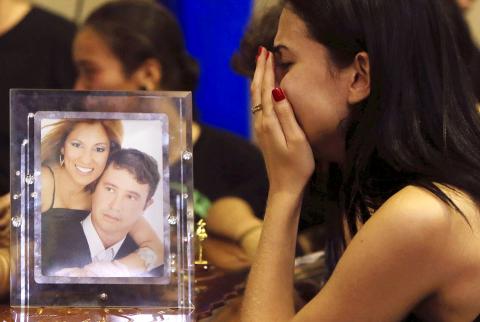The bodies of the young college students were found piled up just inside the entrance of the Kiss nightclub, among more than 230 people who died in a cloud of toxic smoke after a blaze enveloped the crowded locale within seconds and set off a panic.
Hours later, the horrific chaos had transformed into a scene of tragic order, with row upon row of polished caskets of the dead lined up in the community gymnasium in the university city of Santa Maria. Many of the victims were under 20 years old, including some minors.
The first funerals of victims were planned for yesterday.

Photo: Reuters
As the city in southern Brazil prepared to bury the 233 people killed in the conflagration caused by a band’s pyrotechnic display, an early investigation into the tragedy revealed that security guards briefly prevented partygoers from leaving through the sole exit and the bodies later heaped inside that doorway slowed firefighters trying to get in.
“It was terrible inside — it was like one of those films of the Holocaust, bodies piled atop one another,” police inspector Sandro Meinerz said. “We had to use trucks to remove them. It took about six hours to take the bodies away.”
Survivors and another police inspector, Marcelo Arigony, said security guards briefly tried to block people from exiting the club. Brazilian bars routinely make patrons pay their entire tab at the end of the night before they are allowed to leave.
“It was chaotic and it doesn’t seem to have been done in bad faith because several security guards also died,” he said.

MAKING WAVES: China’s maritime militia could become a nontraditional threat in war, clogging up shipping lanes to prevent US or Japanese intervention, a report said About 1,900 Chinese ships flying flags of convenience and fishing vessels that participated in China’s military exercises around Taiwan last month and in January have been listed for monitoring, Coast Guard Administration (CGA) Deputy Director-General Hsieh Ching-chin (謝慶欽) said yesterday. Following amendments to the Commercial Port Act (商港法) and the Law of Ships (船舶法) last month, the CGA can designate possible berthing areas or deny ports of call for vessels suspected of loitering around areas where undersea cables can be accessed, Oceans Affairs Council Minister Kuan Bi-ling (管碧玲) said. The list of suspected ships, originally 300, had risen to about 1,900 as

Japan’s strategic alliance with the US would collapse if Tokyo were to turn away from a conflict in Taiwan, Japanese Prime Minister Sanae Takaichi said yesterday, but distanced herself from previous comments that suggested a possible military response in such an event. Takaichi expressed her latest views on a nationally broadcast TV program late on Monday, where an opposition party leader criticized her for igniting tensions with China with the earlier remarks. Ties between Japan and China have sunk to the worst level in years after Takaichi said in November that a hypothetical Chinese attack on Taiwan could bring about a Japanese

Right-wing political scientist Laura Fernandez on Sunday won Costa Rica’s presidential election by a landslide, after promising to crack down on rising violence linked to the cocaine trade. Fernandez’s nearest rival, economist Alvaro Ramos, conceded defeat as results showed the ruling party far exceeding the threshold of 40 percent needed to avoid a runoff. With 94 percent of polling stations counted, the political heir of outgoing Costa Rican President Rodrigo Chaves had captured 48.3 percent of the vote compared with Ramos’ 33.4 percent, the Supreme Electoral Tribunal said. As soon as the first results were announced, members of Fernandez’s Sovereign People’s Party

MORE RESPONSIBILITY: Draftees would be expected to fight alongside professional soldiers, likely requiring the transformation of some training brigades into combat units The armed forces are to start incorporating new conscripts into combined arms brigades this year to enhance combat readiness, the Executive Yuan’s latest policy report said. The new policy would affect Taiwanese men entering the military for their compulsory service, which was extended to one year under reforms by then-president Tsai Ing-wen (蔡英文) in 2022. The conscripts would be trained to operate machine guns, uncrewed aerial vehicles, anti-tank guided missile launchers and Stinger air defense systems, the report said, adding that the basic training would be lengthened to eight weeks. After basic training, conscripts would be sorted into infantry battalions that would take